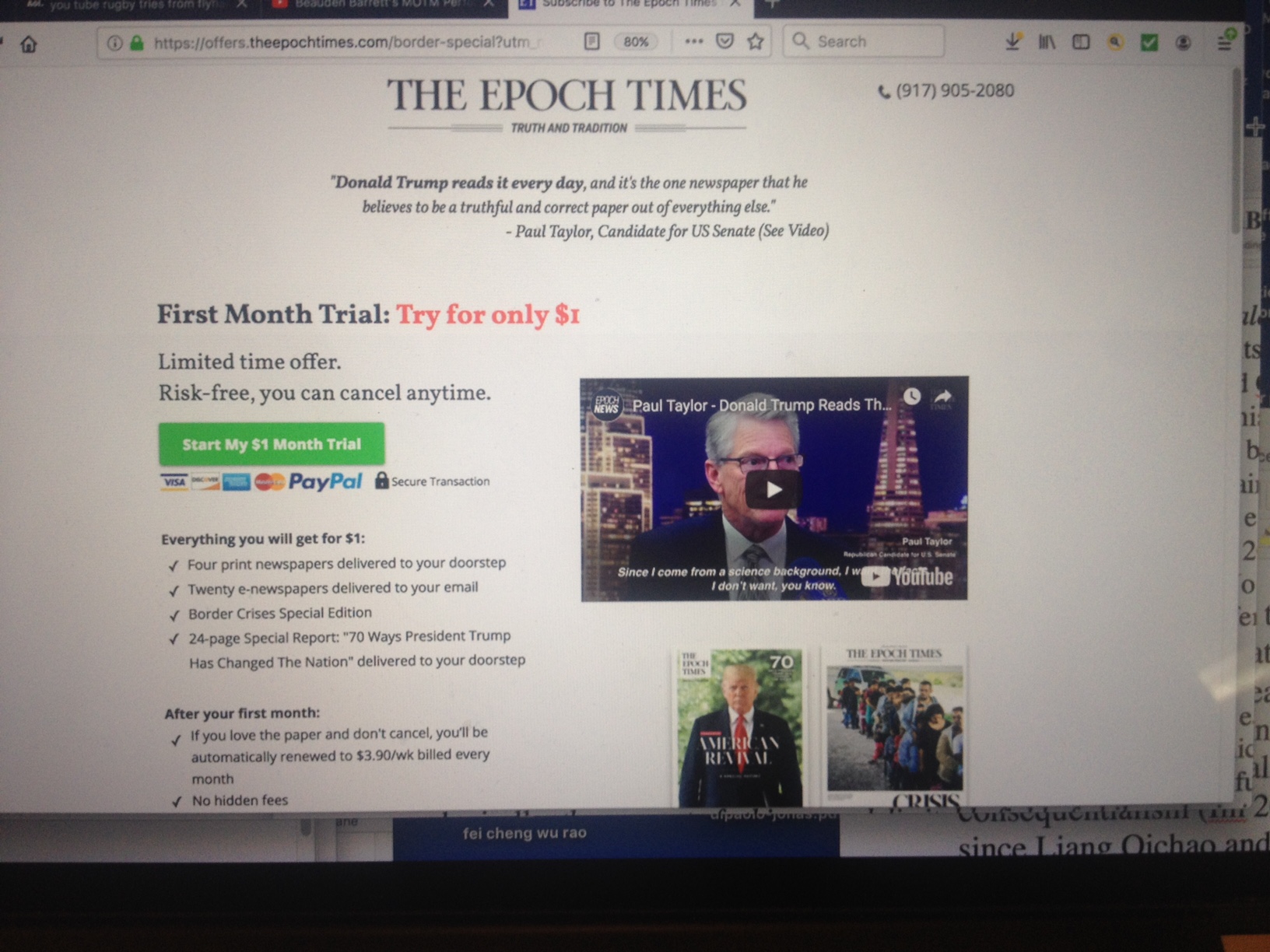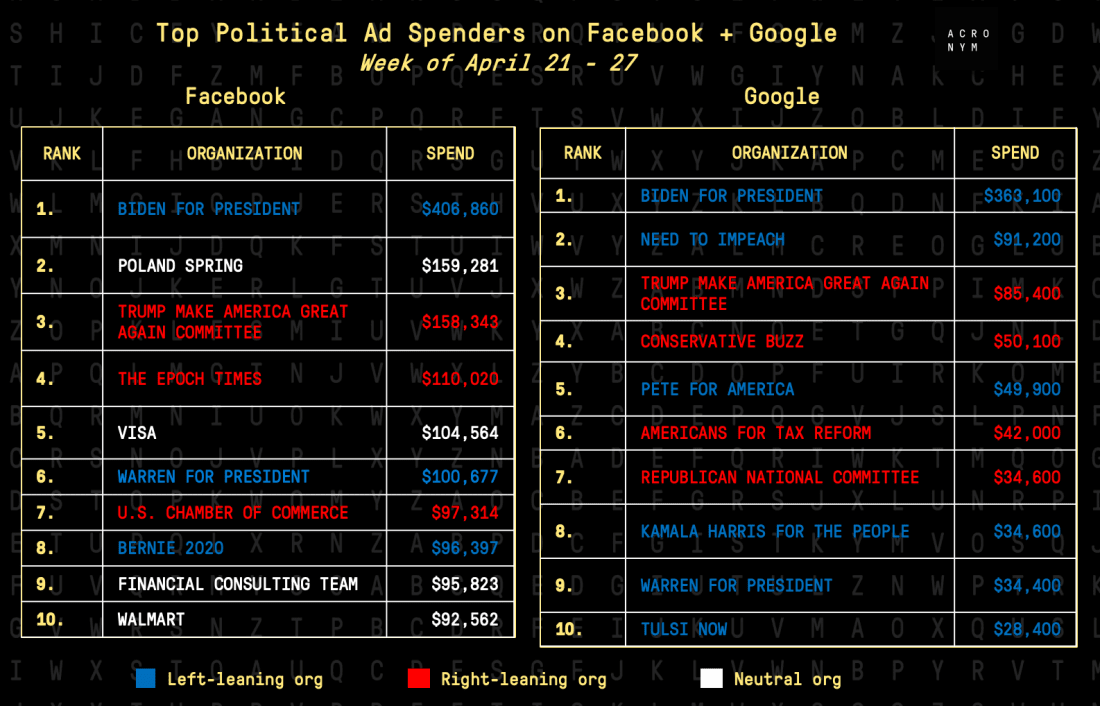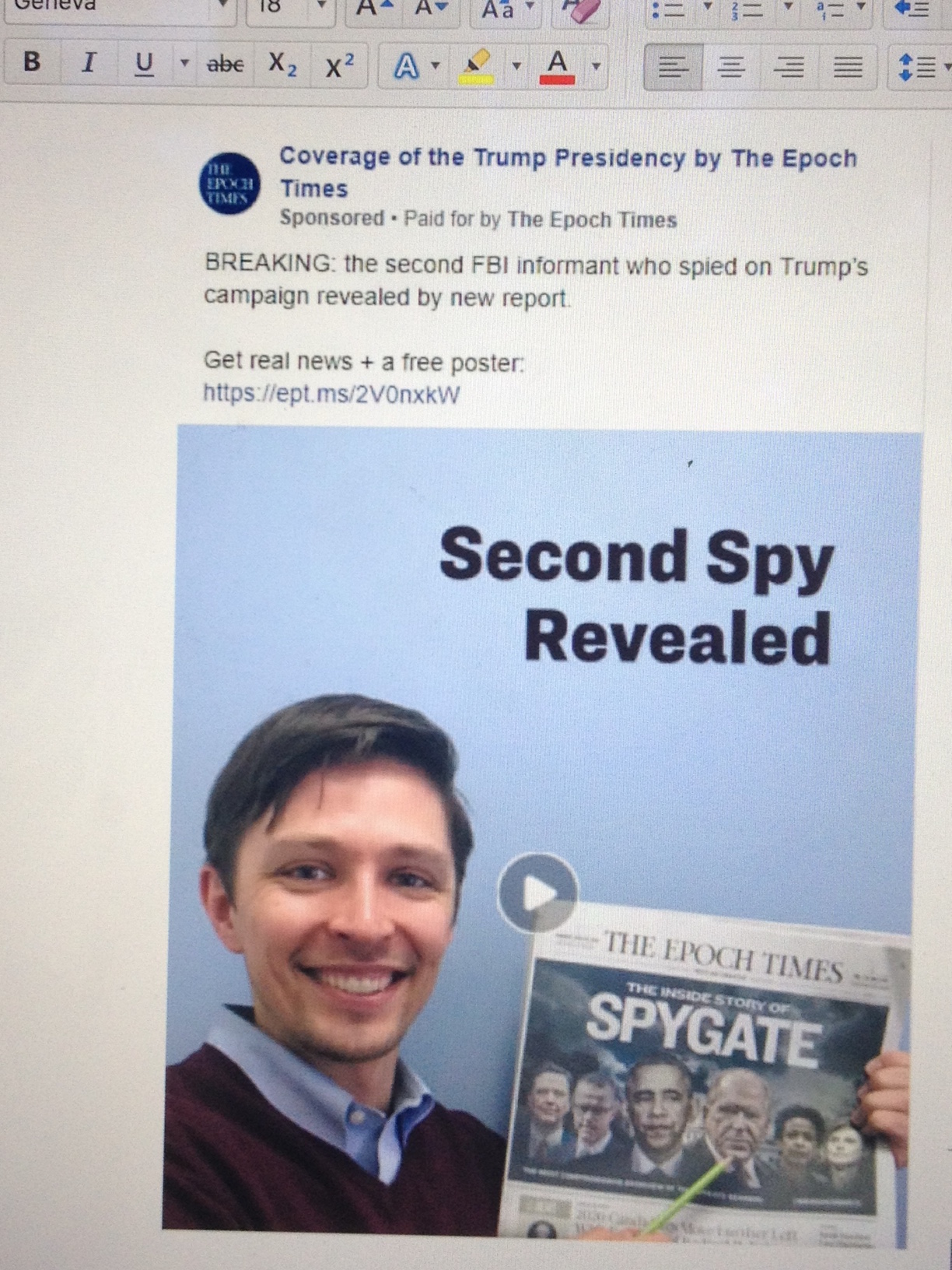Update at August 13 –
I wrote a bit about Epoch Times in the post below, mostly about Chinese getting their news from China news sources like public wechat. Epoch Times is most decidedly anti-CCP, and published by organizations related to Falun Gong, the same people who bring you Shen Yun, the extraordinary dance and performance troup that has been wow-ing Americans for a decade.
In the last two weeks, Epoch Times has been bombarding YouTube with two minute (two minute!) video advertising in advance of a video one is watching. The ads offer subscriptions to the newspaper, promising to expose the lies of the mainstream media in vilifying Donald Trump. Here is a screen shot from one subscription ad. “Honest news” is what they tout.
 Donald Trump reads it every day. ‘Nuff said. Chinese can get their “honest news” from Beijing or Falun Gong. Truly, only no news here is good news.
Donald Trump reads it every day. ‘Nuff said. Chinese can get their “honest news” from Beijing or Falun Gong. Truly, only no news here is good news.
What Chinese are Talking About (3) – Love Mr. Xi, Love Mr. Trump
We know that mainlanders, particularly those in CCP, have a fondness for Mr. Trump. There are several reasons – Chinese historically have been willing to defer to strong leaders, and Trump projects arrogance, if not wisdom. It was clear before the 2016 election that if Trump won, Mr. Putin would win and Mr. Xi would also win. Events bear this out. There is no adversary so easy to fool as one convinced of his own superiority, particularly one with such poor justification. Flattery and artifice will get you … everywhere. For Chinese interested in foreign policy, all they need do is sit back and wait. Trump’s unforced errors – TPP, belittling allies, cozying up to dictators, removing US from environmental treaties, threatening friends and foes alike – make Chinese arrogance and Mr. Xi’s own unforced errors look positively innocuous. What’s not to love about someone willing to play the fool for you?
There is reason to think that Chinese in the US, whether citizens, long-time residents or new green card recipients, might hold more nuanced views about Mr. Trump. And, in fact, they do.
But often not in the direction you might think. Case in point – the Chinese American news, sent around the US on wechat.
You know wechat is the ubiquitous and multifaceted phone app from Tencent that has become indispensable to Chinese lives. For communication purposes, there are two broad categories – private wechat, which functions like a group email, and public wechat, in which wechat operates as a news disseminator.
The news disseminator is well established in the US. There is Chicago American Chinese news, New York American Chinese news, and probably a dozen or twenty more channels. The channels have some local news, and share word for word some national stories.
All the channels function only in Chinese. Anyone can read the news, if they can read Chinese. For many Chinese in America, these channels function as a principal news source. Every Chinese student who is harmed in America gets featured, along with positive stories about inventions and developments in China. The wechat channels function as modern versions of the Polish or German language newspapers our parents or grandparents read.
But in our new era, the politics are different. Rather than a pro-worker or socialist bent, the wechat channels exhibit a distinct pro-Trump, pro-Republican bias.
Some bias among Chinese is understandable – they tend to be opposed to attempts to change university admissions standards, which tends to undercut hard-working and high-achieving Asians. And they tend to be suspicious of Democratic relaxation of immigrant controls, when so many Chinese sacrificed so much to get here themselves.
One should remember that the wechat stories for consumption in America are mostly unsourced, identical across wechat platforms nationally in the US, and written in China or by Chinese working directly for wechat. Five or six national stories are reported each day, in addition to local news.
The wechat groups can be a useful and positive organizing technique. Last year, a Chinese immigrant used WeChat to win a seat in the Maryland House of Delegates. Lily Qi raised nearly $150,000 for her candidacy, and did so by contacting non-registered voters directly, with an appeal to change their non-voting behavior.
On the other hand, Australians are worried about fake news stories planted in the wechat groups to steer political views. The Sydney Morning Herald documents fake news and doctored stories on local wechat groups, and comments – With less than two weeks until the May 18 election, Chinese social media has become an increasingly powerful tool for all political parties, especially in seats with large numbers of Chinese-Australian voters…
Given its dependence on Chinese trade, and its traditional alliance with the other “five eyes” nations (US, Canada, Britain, New Zealand) Australia has become a prime target for Propaganda Ministry or United Front organizations to influence public opinion.
Bill Bishop comments at Sinocism – any government should be very concerned over the growing role of Wechat as the primary communications and media consumption tool of the Diaspora. It is after all still controllable and censorable from Beijing.
Wechat is not the only social media platform operating in Chinese, of course. The political newsletter Popular Information reports on wildly pro-Trump stories in Epoch Times, a media conglomerate with strong ties to Falun Gong, the secretive organization banned in China. A publication with Falun Gong ties is going to be virulently anti-CCP, but they do love Trump.
Epoch Times publishes in Chinese and in English, as well as in other languages. Popular Information reports that Epoch Times “was one of the top three political spenders on Facebook in the last week in April,” outspending every political candidate in the country except Biden and Trump, according to third party research. The money was spent “to promote stories that Trump’s attorney, Rudy Giuliani, has championed.” Epoch Times spent almost as much on Facebook ads ($148,937) as did the Trump campaign ($149,610) in early May. Epoch Times is now featuring hysterical Youtube advertising, debunking the Mueller investigation and directly promoting Trump.
From the Popular Information story. Epoch Times is number 4 –

Also from the Popular Information story, about Epoch Times reporting on the FBI spying on Trump –

if you could read English only moderately well, wouldn’t you migrate to the news in your own native language? Makes sense to me. And makes sense to the wechat writers in Beijing, and to the Chinese and English language writers at Epoch Times. Truly, for Chinese readers in America, no news is good news.

 Donald Trump reads it every day. ‘Nuff said. Chinese can get their “honest news” from Beijing or Falun Gong. Truly, only no news here is good news.
Donald Trump reads it every day. ‘Nuff said. Chinese can get their “honest news” from Beijing or Falun Gong. Truly, only no news here is good news.


Remember Hong Kong
I’ve written quite a bit about the Hong Kong protests – here, on learning from Hong Kongers and here, on the end of soft power and here, with some sympathy for the Hong Kong police.
It feels like we are approaching the end.
At this point, all I can muster is a feeling of sadness and apprehension. The continued protests and violence will only hasten the end of human and civil rights in Hong Kong, when the mainland government feels a mandate to restore order by force, and maintain it. Agreements of 1985 will be of little consequence when public order is truly at stake, as it now seems to be.
Whether the elections are held this weekend or not, they will be a source of further conflict. As you know, CCP still selects or controls most of the candidates and the legislators, even though it is not officially a local political party. Pro-democracy candidates, like Joshua Wong, have been banned from running in elections. The pro democracy candidates usually get about 55-60% of the total votes, but get fewer than half of the legislative seats, due to the indirectly elected share of the total seats.
The violence will spur businesses leaving for Singapore or other places in Asia, and foreign investment will slow. The role of Hong Kong as financial hub for China, a role it has performed admirably since the 1970s, will be diminished. Lenovo, for example, could only get its start in China because it registered as a Hong Kong company – at the time, a foreign company. My friends in Hangzhou and Zhoushan talk about building the “back office” real estate for the new world financial hub in Shanghai. Some of this talk might be boosterism, but I think not all of it. At some point, China will not need Hong Kong and its freedoms as it has in the past. Hong Kong can be absorbed into the new supercity planned to include Shenzhen and Guangzhou.
Scenes from Hong Kong
Hong Kong will remain as a more or less occupied territory, with occasional uprisings. Neither the students nor any future government will be able to bring peace to Hong Kong.
There is no path to success for the protesters, whatever that might be other than physical survival. Many will be arrested and jailed. A few might be killed, either on the street or in custody. It would be ironic if some of those arrested were sent to the mainland for incarceration, since that was the flash point for the original protests this year. But China cannot afford to let Hong Kong become a new world symbol of oppression.
But that is what will happen. In 1836, a group of Texians fighting the Mexican government planned a delaying action at an old mission in San Antonio. The 186 or so Texians at the Alamo facing about 3,000 Mexican troops held out for 13 days, but eventually all were killed. Their sacrifice was soon remembered across Texas – Remember the Alamo! – and it became a rallying cry for Texas independence and American lore across the centuries. Outnumbered, outgunned, surrounded, no hope of victory, they became a symbol of resistance to tyranny.
That seems about all that can be expected from the Hong Kong fiasco. Remember Hong Kong! as a symbol for those living under somewhat autocratic governments now so enamored of Chinese technology and Chinese products. With the economic benefits will eventually come the loss of moral freedom – to speak and write as you wish, to get news free of censorship, to assemble in protest of government action, to vote for representatives.
The US is not exactly a model of governance, peace, or economic hope right now. But Voice of America does still broadcast around the world, in Africa, in South America, in the middle east, in southeast Asia. Someday perhaps VOA can be prouder of its US government sponsorship and can remind the world to Remember Hong Kong! It was in many ways the shining city on a hill. Brigadoon, perhaps, or even Camelot. Watch the final scene – never let it be forgot … that once there was a spot ….
And watch the Hong Kong anthem, written by Hong Kongers